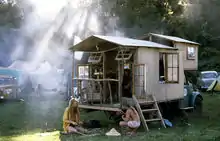Alternative lifestyle
An alternative lifestyle is a lifestyle perceived to be outside the cultural norm. The phrase may be used by someone to describe their own lifestyle or someone else's. Description of a related set of activities as an alternative lifestyle is a defining aspect of certain subcultures.[1] It is often associated with living quite the opposite of the norm, or unconventional.
History
Alternative lifestyles and subcultures originated in the 1920s with the "flapper" movement. It is during these times when women cut their hair and skirts short (as a symbol of freedom from oppression and the old way of living).[2][3] Women in the flapper age were the first large group of females to practice pre-marital sex, dancing, cursing, and driving in modern America without scandal following them.
Examples

The following are examples of alternative lifestyles. This is by no means an exhaustive list.
- Alternative child-rearing, such as homeschooling, coparenting and home births
- Restrictive dieting, such as veganism, vegetarianism, freeganism, or raw foodism
- Living in unusual communities, such as communes, intentional communities, ecovillages, off-the-grid, or the tiny house movement
- Traveling subcultures, including lifestyle travellers, housetrucking, and New Age travelling
- Simple living Bohemianism, Punk rock, Emo, antiquarian steampunk subculture and hippies.
- Body modification, including tattoos, body piercings, eye tattooing, scarification, non-surgical stretching like ears or genital stretching, and transdermal implants
- Cross dressing and transvestism
- Nudism and clothing optional lifestyles
- Non-normative sexual lifestyles, such as BDSM, polyamory, swinging, and certain types of sexual fetishism or paraphilia[4]
- Alternative medicine and natural methods of medical care or herbal remedies as medication
- Adherents to alternative spiritual and religious practices, such as Ordo Templi Orientis, Thelemites, Neo-pagans, Satanists and New Age spiritual communities
- Certain religious minorities, such as the Amish who pursue a non-technological or anti-technology lifestyle
- Secular anti-technology community called Luddites
- Special interest groups into collecting
- Some social and religious conservatives in the U.S. argue that lesbian, gay, bisexual and transgender (LGBT) people have chosen an alternative or “homosexual lifestyle".[5] However, people typically feel no sense of control over their sexual orientation or attractions, and biological explanations for sexual orientation are favoured by scientists.[6] The "gay lifestyle" may also be a disparaging term for a series of stereotyped behaviours.[7]
Initiatives
A Stanford University cooperative house, Synergy, was founded in 1972 with the theme of "exploring alternative lifestyles."[8]
See also
References
- Misiroglu, Gina (2015-03-26). American Countercultures: An Encyclopedia of Nonconformists, Alternative Lifestyles, and Radical Ideas in U.S. History. Routledge. pp. xxxvi–xxxvii. ISBN 978-1-317-47729-7.
- O’Rourke, Ryan (2020-11-17). "Rights group raises fears 'alternative lifestyle' women on garda watchlist". Irish Examiner. Retrieved 2020-12-21.
- Bland, Lucy (2013-09-30). Modern women on trial: Sexual transgression in the age of the flapper. Oxford University Press. ISBN 9781847798961.
- Makai, Michael (September 2013). Domination & Submission: The BDSM Relationship Handbook. Createspace. ISBN 978-1492775973.
- LeVay, Simon (2017). Gay, Straight, and the Reason why: The Science of Sexual Orientation. Oxford University Press. p. 22. ISBN 978-0-19-029737-4.
- Bailey, J. Michael; Vasey, Paul L.; Diamond, Lisa M.; Breedlove, S. Marc; Vilain, Eric; Epprecht, Marc (2016-04-25). "Sexual Orientation, Controversy, and Science". Psychological Science in the Public Interest. 17 (2): 45–101. doi:10.1177/1529100616637616. PMID 27113562. S2CID 42281410.
- Crooks, Robert L.; Baur, Karla (2010-01-01). Our Sexuality. Cengage Learning. ISBN 978-0-495-81294-4.
- "SYNERGY | Residential Education". resed.stanford.edu. Retrieved 2020-10-29.